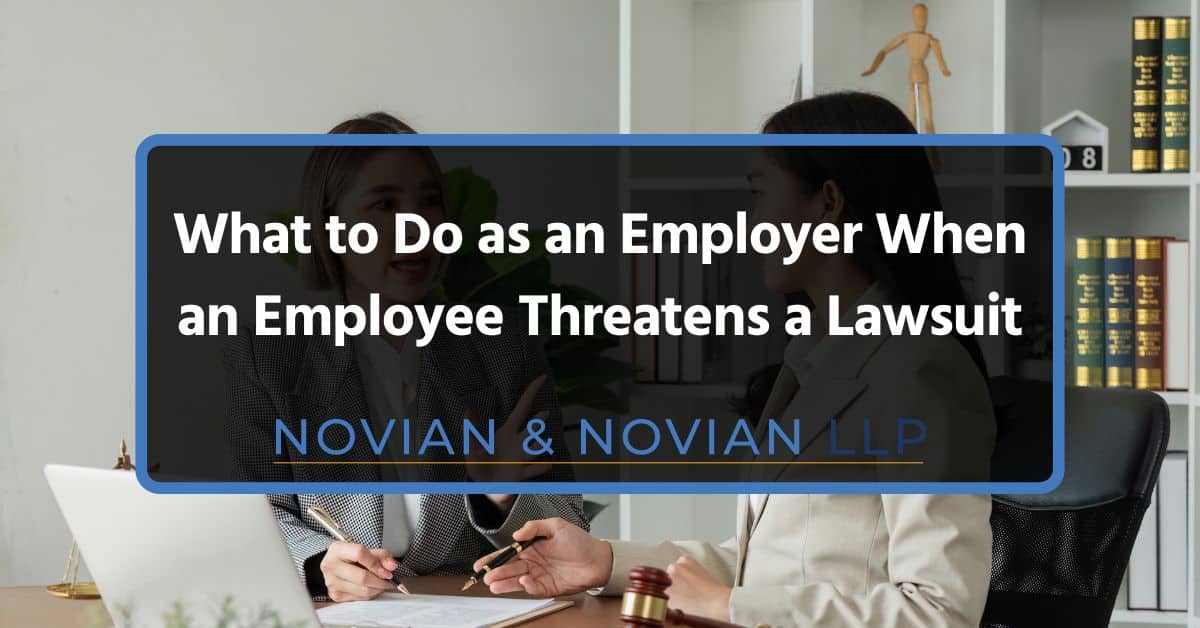When an employee threatens a lawsuit, it’s a serious matter demanding immediate and careful attention. Such claims, whether they are related to discrimination, wrongful termination, harassment, wage disputes, or retaliation, can carry serious legal, financial, and reputational implications for an organization. This is why remaining calm and composed is crucial for assessing the situation clearly and responding professionally.
Reaching out to an employment lawyer for legal counsel is highly recommended, as they can guide you in responding both professionally and legally. Engaging legal support early helps ensure compliance with labor laws, mitigates potential risks, and protects the organization’s interests moving forward.
At Novian & Novian, we have over 30 years of experience navigating employment law. If your employee is threatening you with a lawsuit, our employment lawyers are available to give you professional guidance and support. Contact us now!
This post will provide a step-by-step guide on what to do when an employee threatens a lawsuit. We will also explore common reasons why an employee might sue and preventive measures you can take as an employer.
Table Of Contents
- Understanding Employee Lawsuit Triggers
- What to Expect From a Lawsuit
- Responding When an Employee Threatens a Lawsuit
- Communicating With the Employee
- Mediation and Conflict Resolution
- Preventive Measures for Your Business
- Need Legal Representation for an Employee Lawsuit?
- Frequently Asked Questions
- When Should You Settle vs. When Should You Fight?
- Should I Respond to the Employee Directly or Through a Lawyer?
- Is it Always Necessary to Involve a Lawyer if an Employee Threatens to Sue?
- Can You Fire an Employee for Threatening to Sue?
- What Happens if I Ignore the Threat and Do Nothing?
- Should I Notify My Business’s Insurance Provider?
Understanding Employee Lawsuit Triggers
Employees may decide to sue their employers for various reasons, often related to workplace rights and conditions. Common reasons include:
-
Retaliation Claims: These arise when an employee is subjected to adverse action for engaging in protected activities, such as reporting discrimination or harassment.
-
Discrimination: Lawsuits often stem from alleged discrimination based on protected characteristics like race, color, religion, sex, national origin, age, disability, or genetic information. As an employer, compliance with federal, state, and local anti-discrimination laws (e.g., the Civil Rights Act, Americans with Disabilities Act (ADA), Age Discrimination in Employment Act (ADEA)) is crucial.
-
Wage and Hour Claims: These typically involve disputes over unpaid wages, overtime wages, employee misclassification, or violations of meal and rest break laws.
-
Sexual Harassment: Claims usually center on unwanted sexual advances, requests for sexual favors, and other verbal or physical harassment of a sexual nature.
-
Wrongful Termination: This occurs when an employee is terminated in violation of an employment contract, public policy, or laws protecting employees from discrimination or retaliation.
-
Breach of Contract: Disputes can arise if an employer is perceived to have violated the terms of an employment agreement.
-
Unsafe Working Conditions: Employees may sue if they believe the employer failed to provide a safe work environment.
For such situations, specialized legal counsel is often necessary. A discrimination defense, wage and hour defense, sexual harassment defense, or wrongful termination employer defense attorney can help develop a sustainable legal defense and provide representation.
What to Expect From a Lawsuit
When facing lawsuits or employer threats, you can expect to either go to court or settle out of court. Most employment disputes are settled out of court to avoid the costs and uncertainties of litigation.
On average, the cost of defense settlements is usually around $75,000. However, if a settlement isn’t reached, the case may proceed to court, which can be lengthy and expensive. The average cost to defend an employment lawsuit could easily exceed $125,000.
Furthermore, legal battles can damage your company’s reputation, disrupt business operations, and negatively affect employee morale. The stigma of such lawsuits often takes time to dissipate. Having legal representation is critical, as employment lawyers specialize in defending employers and possess the expertise to navigate complex legal issues and provide strategic advice.
They will help you understand employment laws better and ensure your organization stays compliant, protecting your company from substantial financial and reputational damage.
Responding When an Employee Threatens a Lawsuit
Staying Calm and Assessing the Situation
When an employee threatens the employer with legal action, it’s best to remain calm and composed. Immediate defensive reactions can escalate the situation. By staying calm, you can better assess the situation and respond in a measured and professional manner. Avoid jumping to conclusions or making hasty decisions.
Take time to fully understand the threat before making a decision to prevent potentially worsening the situation or hindering a fair resolution.
Gathering Information
When faced with employment claims, you should gather all relevant information, including the nature of the threat, the context in which it was made, and any accompanying documentation or communications. This comprehensive documentation would help you understand the issue and prepare a response. Identify the underlying concerns and the claims that led to the threats.
This understanding would help address the employee’s claims effectively and potentially resolve the matter before it escalates. Implement a litigation hold to preserve all relevant business records.
Reviewing Company Policies and Legal Obligations
Next, examine your company’s policies and procedures to ensure adherence. This includes reviewing relevant guidelines on employee conduct, grievance handling, and termination processes. This review ensures your actions are consistent with company policies and can help manage the situation effectively.
Importantly, ensure all actions taken in response to the threat align with company guidelines and legal requirements, maintaining fairness and legality in your handling of the situation.
Consulting With Legal Counsel
As an employer, it helps to work with a legal defense that understands and specializes in employment law. This legal counsel will help you understand the potential legal implications of the threat and provide valuable advice on how to navigate the situation. An employment attorney will help you and your organization stay compliant with state and federal laws.
At Novian & Novian, our expert employment lawyers provide legal counsel if you’re facing a lawsuit from an employee. With years of experience, they are ready to help you prepare for any potential legal action. Contact us today! Maintain attorney-client privilege in all communications.
Documenting Everything
As an employer, you must maintain comprehensive and accurate records of all communications and actions related to the threat. This includes written records of interactions with the employee, details of the complaint, and any actions taken in response. This would come in handy when you have to write up an employee.
Detailed documentation is necessary for defending against any potential legal claims and ensuring a clear record of events. This documentation will be valuable in understanding the context and addressing the issues raised. In drawing up this documentation, develop a timeline outlining the events that led to the employee’s threat. This timeline should include key employees, interactions, decisions, and any incidents relevant to the issue.
Communicating With the Employee
Handling a disgruntled employee who has threatened the employer with legal action requires delicate handling to maintain a professional relationship and prevent further escalation. If the employee has already been terminated, the focus shifts to addressing the claim and preparing for potential legal action while ensuring that communication is professionally and legally compliant.
Scheduling a Meeting
For current employee situations, arrange a private meeting to discuss their concerns. Ensure the setting is neutral to make the employee feel comfortable and avoid any perceived biases. Choose a location that is neutral and free from distraction. This creates an environment conducive to open and honest communication, helping to resolve issues more effectively.
Listening and Responding
During the meeting, listen to the employee’s concerns carefully and without interruption. This demonstrates respect and a willingness to understand their perspective, which can help in defusing the situation. Then, respond to the issues raised by the employee respectfully and constructively.
While it is important to acknowledge their concerns, avoid making any promises that could be construed as admissions of guilt or liability. It also helps to focus on understanding the issues and discussing potential steps to address them.
Mediation and Conflict Resolution
When an employee threatens a lawsuit, mediation and conflict resolution can be effective strategies to address and resolve the underlying issues before they escalate further. It could be through internal mediation or external mediation.
Internal Mediation
Internal mediation involves using resources within the company to address the conflict. This can be a cost-effective and timely way to resolve disputes and may prevent the need for external legal action. For example, engage the human resources department or a neutral third party within the organization to mediate the conflict. A neutral mediator can help facilitate open communication and negotiation between the employees involved, aiming for a fair and amicable resolution. This helps when certain managers are involved.
External Mediation
If internal mediation fails (e.g., if the employees involved and certain managers allow their emotions to get the best of them and cannot communicate effectively), consider external mediation services. Typically, external mediators bring an unbiased perspective and have specialized training in conflict resolution, which can be particularly valuable in complex disputes.
Furthermore, external mediators work to understand the perspectives of all parties involved and facilitate discussions aimed at reaching a mutually acceptable solution. Their role is to guide the process, help clarify issues, and suggest possible solutions without imposing a decision.
Preventive Measures for Your Business
There are certain preventive measures you can undertake as an employer to minimize the risk of future employee lawsuits. These preventive measures also help maintain a positive and compliant work environment.
One such measure is implementing regular training on conflict resolution and legal compliance. These training sessions are necessary for both employees and managers as they equip them with the necessary skills to handle disputes effectively and understand their legal obligations. Through the sessions, the chances of misunderstandings and conflicts escalating into legal action will greatly reduce.
Another preventive measure is promoting a culture of open communication and respect. By fostering such, you are encouraging employees to voice their concerns and grievances without fear of retaliation. This open communication helps in addressing issues early and prevents them from festering into bigger problems that might lead to employee lawsuits.
Furthermore, regularly review and update company policies. This helps in mitigating risks and ensuring that the company’s practices are aligned with legal standards. Additionally, ensure that employees are aware of and understand company policies. Advise employees on their rights.
Need Legal Representation for an Employee Lawsuit?
When an employee threatens a lawsuit, it is best to handle the situation professionally and legally. You must stay calm and assess the situation. Then, gather information, review company policies, consult with legal counsel, and document everything. You can also try engaging in mediation and resolution, where you advise employees involved to choose settlements instead of going to court. Successfully defending against an employee’s lawsuit requires careful attention.
As a Los Angeles Employer Defense Practice, Novian & Novian provides expert legal representation and advice on handling employee lawsuits. Our experienced employment lawyers are here to guide you through every step of the process. Contact us now!
Frequently Asked Questions
Here are the answers to some of the most common questions employers ask us about what to do when an employee threatens them with a lawsuit:
When Should You Settle vs. When Should You Fight?
The decision of whether to settle or fight an employee lawsuit depends on various factors assessed by an employment lawyer. If the threatened lawsuit appears baseless, fighting it might be worthwhile.
If the allegations are strong, a settlement might be a more prudent professional response to avoid a lengthy and time-consuming legal battle.
Should I Respond to the Employee Directly or Through a Lawyer?
It’s wise to consult an employment lawyer after receiving the first notification, before responding. Your employee’s lawyer may have sent a demand letter. A lawyer ensures legal compliance and advises on the best communication strategy, including whether they should communicate on your behalf.
Is it Always Necessary to Involve a Lawyer if an Employee Threatens to Sue?
While not always mandatory, it’s highly recommended. An employment lawyer assesses the threatened lawsuit’s legitimacy, advises on your legal rights, and strategizes your response. Early legal action can prevent a minor issue from escalating into costly litigation.
Can You Fire an Employee for Threatening to Sue?
Firing an employee solely for threatening a lawsuit, especially if it relates to protected activity (e.g., reporting discrimination), can be considered a retaliation claim and lead to more claims. However, if the threat is in bad faith or combined with other misconduct, circumstances may differ. Consult an employment lawyer to understand your legal rights and avoid a mistake.
What Happens if I Ignore the Threat and Do Nothing?
Ignoring an employee’s threat of a lawsuit is very risky. The employee might file a formal lawsuit, potentially leading to a default judgment against your company. This can result in significant financial penalties and reputational damage. Promptly deal with such contacts.
Should I Notify My Business’s Insurance Provider?
Yes, notify your business’s insurance provider immediately if your employee threatens legal action. Many policies, especially Employment Practices Liability Insurance (EPLI), cover employee lawsuits. Failing to report within their timelines could result in coverage denial. Review your policy for such an instruction.






